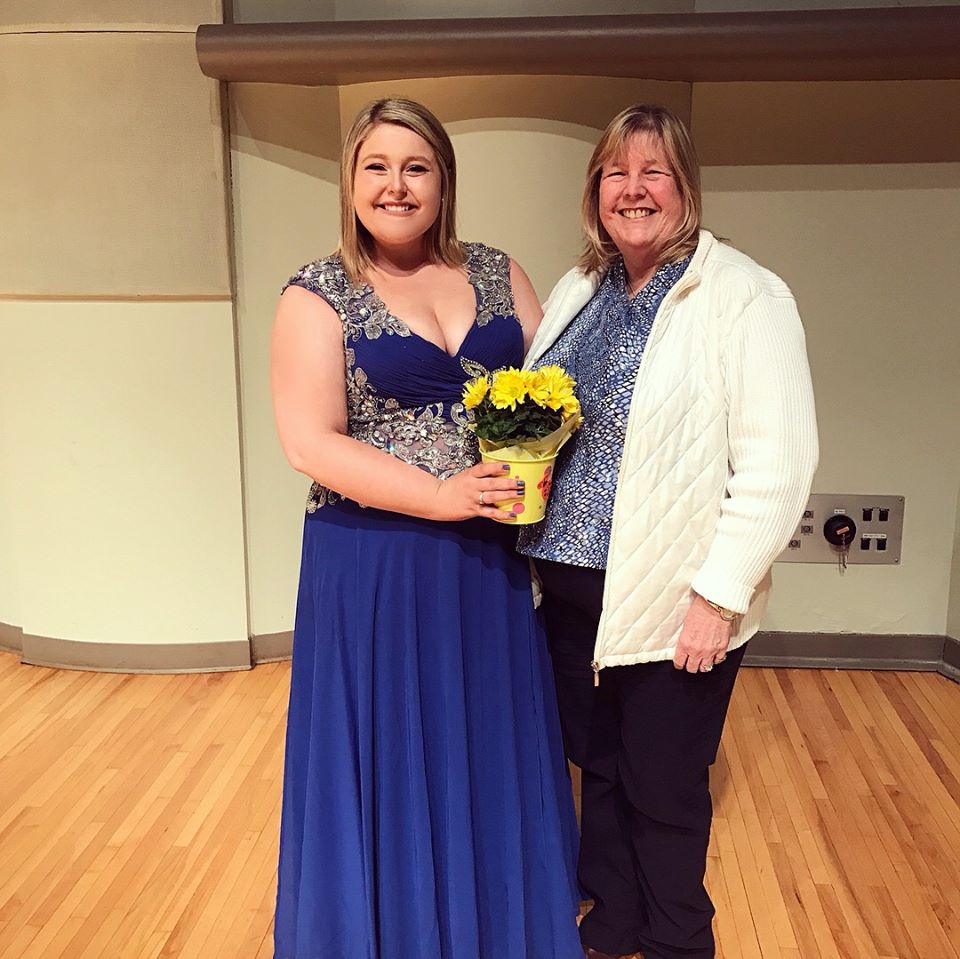Mary Balentine was one of the third of U.S. children who grew up with an unmarried parent, which brought on challenges but also built a stronger mother-daughter relationship.
It was late at night, around 8 p.m., when 5-year-old Mary Balentine went up to the bay window of her house in Elkhart, Indiana. It was snowing outside. She pressed her little hands to the glass. Her mother, Janet, was behind her when she turned around.
When’s daddy coming home from the bar? Mary asked.
I don’t know, honey. Let’s go to bed. Her mother steered her from the window.
In that moment, Janet knew enough was enough. She gave Mary’s father an ultimatum: Stop the drinking, or get a divorce. He couldn’t quit, so Janet decided she would raise her daughter on her own after 16 years of marriage.
The divorce was hard, and Janet realized she would need to go back to work after being a stay-at-home mom for the past five years.
“I actually pretty much had a nervous breakdown,” Janet says. “I went to see a counselor. I said: ‘Janet, you got to put on your big girl panties and get your act together.’”
Janet’s is just one voice in the sea of many that tell the story of single parenting. Whether parents are widows, divorcees, or were never married at all, the circumstances vary. Since 1968, the number of children living with an unmarried parent has more than doubled from 13 percent to 32 percent in 2017, according to Pew Research Center. Robin Box, an assistant professor of early childhood, youth, and family studies at Ball State University, says there are multiple reasons for this, including trends in couples getting together who don’t have the same morals or values. She says high rates of addiction and divorce have also become more accepted in society.
Apart from her father’s cooking, Mary was too young after the divorce to ever feel like too much had changed. Janet got full custody of Mary, and visits with her father were very few.
Okay, it’s just mom now, Mary recalls thinking.
Now a junior at Ball State majoring in sales, Mary admires her mother’s strength and continues to lean on her for support. If she could go back in the past, she would take back all the times she talked back to her mom when she was younger.
Box says certain daily stressors can be especially hard on single parents, such as finances, child care, and other domestic matters. Physical and emotional health issues can also make parenting more difficult.
Through Mary’s childhood, Janet tried to protect her from the financial struggles they faced after the divorce. The absence of a second income was a huge strain, and the home mortgage was always a looming expense. Janet had to take Mary out of private school and get her enrolled to receive reduced-cost lunches.
“I never really had any trouble playing both loving mother and stern father,” Janet says.
She has been a working mother ever since the divorce, but Janet never let her career get in the way of her role as a mom. When they went shopping, Mary rarely saw her mom buy things for herself. But Janet made sure Mary knew she wasn’t a burden: She was her daughter.
Through all the struggles, Mary only saw her mother cry once, when she came home one day and found her mom in the living room. Janet stopped crying and apologized, but Mary just sat down and hugged her, starting to cry, too.
Mary became a vegetarian at 12 years old, after seeing a deer strung up in her father’s garage, and her mom sometimes got frustrated at having to cook two separate meals. But eventually, it became the norm. When making goulash, her mother would make one portion with meat and one without.
Growing up, Mary and her mom did everything together: ice skating in matching skates, shopping, and cooking. In the kitchen, Janet would lift Mary onto the counter so she could help stir. She would leave little notes in Mary’s lunchbox before school.
They were, and still are, each other’s best friends.
Janet took Mary to every lesson, ballet recital, basketball game, and band concert (where Mary played the mellophone). She went to every jazz band performance, even though she hated jazz. She even went to performances Mary wasn’t in to support the other kids. She was known as the “squad mom” to Mary’s close group of friends and teammates.
Box says most information about single parenting tends to focus on the drawbacks. She thinks it’s unfortunate that more people don’t talk about the benefits.
According to the Single Parents Alliance of America (SPAOA), single parents and their children can develop stronger bonds, share responsibilities both in and outside of the house, and learn how to face adversities or balance priorities together.
 Mary says she and her mother are like the characters from one of their favorite TV shows: Gilmore Girls. But instead of coffee, they drink Diet Coke. “We see a lot of ourselves in them,” Mary says, referring to the Type A daughter and the more laid-back mother in the show.
Mary says she and her mother are like the characters from one of their favorite TV shows: Gilmore Girls. But instead of coffee, they drink Diet Coke. “We see a lot of ourselves in them,” Mary says, referring to the Type A daughter and the more laid-back mother in the show.
When Mary came to college, she began to suffer separation anxiety. She was extremely homesick the first few weeks. Janet also had a hard time adjusting to living without her daughter. Now by herself with no other children—Mary was an only child—she misses those moments she was used to sharing with “M.E.,” Mary’s nickname from her mom, pronounced “Emmy.”
Now, Janet watches television and doesn’t have someone to immediately talk about it with. She goes to bed in an empty house every night. She cooks non-vegetarian dinners for one.
Mary misses hugging her mom at the end of the day, eating dinner with her, and just being around her. But they compensate with phone calls almost every day, talking about anything and everything, even down to what color outfit Mary should wear. They go to church together whenever Mary visits, and have weekly group calls with Mary’s aunts every Sunday night.
Shortly after coming to college, Mary’s kidneys started shutting down. “My first thought was to drive home to go to my hospital…but they said I wouldn’t make it home because it was three hours,” she said. She called her mom.
Honey, I really can’t make it. I’m so sorry, but I called your dad, and he’s coming.
Mary was devastated. She would have rather had her mom with her.
Mary was in the hospital overnight, receiving medication intravenously while her dad stayed with her. They talked on and off, killing time and waiting for Janet to arrive.
In the end, Mary was happy her dad was there. She knew that he was trying. He constantly asked if she needed anything, and they watched Shameless together.
Even after the divorce, Mary’s parents are still great friends. They even go out to eat, sometimes without Mary. One evening, the three of them went out to dinner, her parents laughing and making jokes at the table. After, the waitress asked if all the leftovers should go in one bag, assuming they’d all be going home to the same place. When her parents said they were actually divorced, the waitress was stunned that the exes had such a strong relationship.
When Mary thinks about who her family is, she says it’s her mom and her three aunts who live in southern Florida. Since there is no man in the family, Mary sees them as her father figures, and they played a huge part in her upbringing. They have helped her financially and supported her through hard times, but could also put her in her place if needed.
Mary Elizabeth, that’s not how you talk to someone.
Mary Elizabeth, mind your manners.
“When you think of a dad, you think of a businessman who comes home and tells dad jokes,” Mary says. “That’s my Aunt Barb.”
With two aunts in sales and one who was a secretary, they all come from business backgrounds, so Mary goes to them for advice on her sales major. The term “it takes a village” is one Mary believes to be true about her upbringing in her family of women.
Mary would never trade her childhood for anything. She learned to become independent when she had to entertain herself while her mom was at work. She is cautious about spending money, and she’s learned how to budget. She was also raised to be respectful and kind. Janet still cries whenever Mary leaves after a visit, but she’s proud of the girl she raised.
“When they’re out there taking care of themselves, making accomplishments,” she says, “there’s a sense of pride that you’ve done a good job.”




